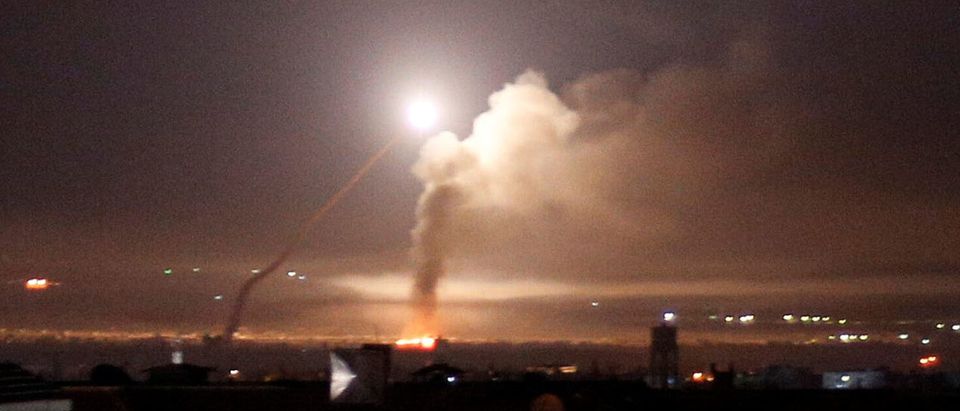Israel exchanged rocket and cruise missile fire with Iranian forces deployed inside Syria during an hours-long battle late Wednesday, the biggest direct confrontation between the two countries since the 1973 Yom Kippur War.
Responding to a barrage of rockets reportedly fired by Iranian troops at Israeli positions in the Golan Heights, Israel Defense Forces (IDF) attacked nearly all of Iran’s military installations in Syria, an IDF spokesman said, according to the Associated Press.
Targets included a weapons storage facility, logistics sites and intelligence centers used by the Quds Force, the special operations division of Iran’s Revolutionary Guard Corps. Also destroyed were several Syrian air-defense systems, which activated against Israeli fighter jets.
None of the warplanes were hit, the IDF said.
The flare-up marks a major escalation between Jerusalem and Damascus, which were already poised for a fight over the presence of Iranian military assets inside Syrian territory. Israel considers Iran’s ongoing military buildup in Syria to be an unacceptable national security threat.
Tehran did not comment on the clash, though Iranian media described the Israeli assault as “unprecedented.” Syria’s military confirmed that the strikes killed three people, wounded two others, and destroyed multiple targets including a radar station and an ammunition warehouse. It did not acknowledge that any of the targets were Iranian assets or personnel.
The battle came a little more than a day after President Donald Trump announced the U.S. would withdraw from the 2015 Iran nuclear deal, a move backed by Israel and several Arab countries in the region. Some international observers worried the decision would exacerbate Israeli-Iranian tensions in Syria, though it is not clear what, if any, role it played in sparking Thursday’s confrontation.
Uncertainly over the Iran deal notwithstanding, it was clear the initial rocket attack and resulting IDF response pushed the conflict in Syria to a “new phase,” as Israeli Defense Minister Avigdor Lieberman said Thursday at a security conference. Israel has already acknowledged launching more than 100 airstrikes in Syria since that country’s civil war broke out in 2011. But in recent weeks, Israel has moved into an open proxy conflict with Iran, striking Syrian military installations and killing some Iranian troops deployed there.
“Israel-Iran tensions have been escalating in Syria weeks now and we may very well get to a boiling point,” Georgetown University international relations professor Arian Tabatabai wrote Wednesday. “This would only exacerbate the already disastrous situation in Syria and open another front between two regional powers.”
The most recent battle kicked off late Wednesday, when a salvo of about 20 rockets was launched at IDF positions in the Golan Heights, formerly Syrian territory captured by Israel in the 1967 Six Day War. Israel said Iranian Quds Forces had fired the rockets, which set off air raid sirens across the Golan Heights.
Four of the rockets were intercepted, while the rest fell short of their intended targets, according to IDF spokesman Lt. Col. Jonathan Conricus. The barrage is thought to be the first time in decades that sustained rocket fire has targeted Israeli troops in the Golan.
Israel hit back with a massive response that included fighter planes and ground-launched ballistic missiles. The IDF did not reveal the scope of the response, but Russian military observers stationed in Syria said 28 Israeli jets were involved and more than 70 missiles were fired, the AP reported.
“We, of course, struck almost all the Iranian infrastructure in Syria, and they need to remember this arrogance of theirs,” Lieberman said of the assault. “If we get rain, they’ll get a flood. I hope that we ended this chapter and that everyone understood.”
In the aftermath of the battle, European leaders called on both Israel and Iran to de-escalate the proxy battle in Syria.
“We know that we face an extremely complicated situation here,” German Chancellor Angela Merkel said Thursday, according to the AP. “The escalation of the last few hours shows it is truly a matter of war and peace, and I can only call on all involved to exercise restraint.”
Washington offered a less neutral take on the situation, saying Iran “bears full responsibility” for provoking the Israeli assault on Syria.
“The United States condemns the Iranian regime’s provocative rocket attacks from Syria against Israeli citizens, and we strongly support Israel’s right to act in self-defense,” White House Press Secretary Sarah Sanders said in a statement. “The Iranian regime’s deployment into Syria of offensive rocket and missile systems aimed at Israel is an unacceptable and highly dangerous development for the entire Middle East.”
Send tips to will@dailycallernewsfoundation.org.
All content created by the Daily Caller News Foundation, an independent and nonpartisan newswire service, is available without charge to any legitimate news publisher that can provide a large audience. All republished articles must include our logo, our reporter’s byline and their DCNF affiliation. For any questions about our guidelines or partnering with us, please contact licensing@dailycallernewsfoundation.org.


